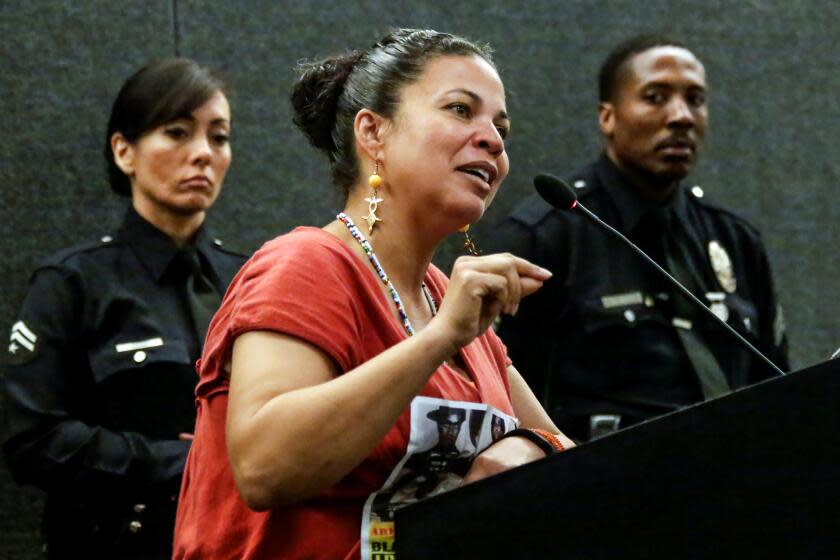Black Lives Matter co-founder files appeal in 'swatting' lawsuit, citing new evidence

Black Lives Matter-L.A. co-founder Melina Abdullah is trying to revive a lawsuit over the Los Angeles Police Department's response to a "swatting" incident at her home in 2020, saying previously undisclosed evidence suggests the original 911 call could have been a "fiction" made up by police.
In her original suit, Abdullah alleged police ignored signs that the hostage emergency reported by the 911 call wasn't real and proceeded to surround her home with more than a dozen officers in tactical gear. Abdullah's suit said police turned over information to her attorneys suggesting that the false report was made by a teenager living in Maryland, who was identified as "X" in court documents.
Attorneys for the city countered that police should not be held liable for any damages, because they were responding to what they believed was a legitimate hostage situation. After five days of testimony last month, a jury ruled in favor of the city and the two police officials named in her suit, Sgt. James Mankey and Officer Jose Perez.
During the trial, jurors heard a recording of the fake hostage report by someone calling himself "Dale Brooks" or "Dale Brook." Speaking in a pronounced Southern accent, the caller told a 911 operator that he wanted $1 million or he would shoot the three people he’d taken hostage inside a home. He gave Abdullah's address, without saying her name.
Read more: Black Lives Matter co-founder takes LAPD to trial for 'swatting' prank response
But in a motion filed Monday, Abdullah asked for a new trial on the grounds that police withheld material information calling into question their investigation of the 911 call. Notably, the motion filed in Los Angeles County Superior Court alleges police failed to disclose that the "swatting" call may have been carried out by "a group of teen gamers who lived out of the state," instead of one individual, and that the original teenage suspect, "X," had since left the country.
"If Plaintiff’s investigation of 'X' were to determine that neither 'X' nor the other gamers were real people, then that would be evidence that LAPD knew that the 911 call was a hoax and did not perform a diligent investigation before sending the full force of the LAPD to Plaintiff’s home," Dermot Givens, Abdullah's attorney, wrote in a declaration supporting the motion.
Givens wrote that he first learned of this during the cross-examination of a Major Crimes Division detective, despite repeatedly pressing the department for details about that investigation but getting no answers.
"Such evidence would have allowed the jury to reach a different verdict at trial," Givens wrote, "because it would likely have convinced the jury to determine that LAPD knew the 911 call was a hoax, and even potentially that LAPD had made up the 911 call themselves to harass Plaintiff."
By all appearances, investigators made little effort to try to track down and interview the suspect, Givens argued in the motion. This, he said, raised questions about whether the incident was part of a larger campaign by the department to silence Abdullah, one of its staunchest critics.
Had they known that "X" left the country, Abdullah's legal team argued, they would have contacted the Department of Homeland Security to "determine if 'X' was a real person and was available for an interview about the 911 call." That disclosure also might have changed the outcome of the trial, they contended in the Monday motion.
"The jurors having evidence that 'Dale Brook' was a complete fiction created by the Defendants would have allowed the jurors to reach a different verdict," Givens wrote.
Read more: Jury rules against Black Lives Matter co-founder in LAPD 'swatting' lawsuit
When reached Tuesday, an LAPD spokesperson referred questions to city attorney's office, which didn't immediately respond to an email seeking comment.
In response to the alleged hostage threat, police dispatched more than a dozen officers from the nearby Wilshire Division to Abdullah’s home, along with a helicopter.
Abdullah sued the city over the incident in 2021, saying she and her three children were left fearing for their lives when officers aggressively approached their home, some with guns at the ready.
The city argued in court that the police response had nothing to do with Abdullah's stature in local political circles. Mankey testified that he didn't recognize Abdullah; body-camera video played at the trial showed him looking her up on Facebook.
At the time, numerous city officials called for an investigation of the police response. The incident came in the wake of a summer of widespread protests over the murder of George Floyd in Minneapolis, during which Abdullah emerged as a visible local critic of policing in general and the LAPD in particular.
Numerous celebrities and public figures have over the years been victims of so-called swatting incidents, in which an individual or group of people intentionally reports a fake threat to provoke a heavily armed law enforcement response at a specified location.
Authorities say perpetrators often go to great lengths to mask their digital identity and location, making prosecution challenging.
Abdullah had previously been the target of numerous swatting calls. Authorities have said a group of teenagers, motivated by racial hatred, were responsible for two previous swatting incidents at her home. Abdullah and her attorneys said they were prevented from showing the jury evidence about these prior incidents.
Her lawsuit said she was not aware of any investigation or findings stemming from the incident, but “still lives in fear of another similar police incident.” Her defense team has argued that the presence of a police helicopter hovering overhead and scores of armed police officers outside her home was a brazen show of intimidation rather than an attempt to come to her rescue.
This story originally appeared in Los Angeles Times.


